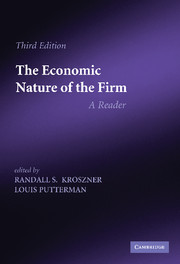Book contents
- Frontmatter
- Contents
- Editors' preface
- Reintroducing The Economic Nature of the Firm
- Part I Within and among firms: the division of labor
- Part II The scope of the firm
- Part III The employment relation, the human factor, and internal organization
- Part IV Finance and the control of the firm
- 19 Mergers and the market for corporate control
- 20 Agency problems and the theory of the firm
- 21 Theory of the firm: managerial behavior, agency costs, and ownership structure
- 22 Organizational forms and investment decisions
- 23 The rise in managerial stock ownership
- 24 Executive compensation as an agency problem
- 25 An economist's perspective on the theory of the firm
- 26 Ownership and the nature of the firm
- References
- References
21 - Theory of the firm: managerial behavior, agency costs, and ownership structure
Published online by Cambridge University Press: 05 June 2014
- Frontmatter
- Contents
- Editors' preface
- Reintroducing The Economic Nature of the Firm
- Part I Within and among firms: the division of labor
- Part II The scope of the firm
- Part III The employment relation, the human factor, and internal organization
- Part IV Finance and the control of the firm
- 19 Mergers and the market for corporate control
- 20 Agency problems and the theory of the firm
- 21 Theory of the firm: managerial behavior, agency costs, and ownership structure
- 22 Organizational forms and investment decisions
- 23 The rise in managerial stock ownership
- 24 Executive compensation as an agency problem
- 25 An economist's perspective on the theory of the firm
- 26 Ownership and the nature of the firm
- References
- References
Summary
The directors of such [joint stock] companies, however, being the managers rather of other people's money than of their own, it cannot well be expected that they should watch over it with the same anxious vigilance with which the partners in a private copartnery frequently watch over their own. Like the stewards of a rich man, they are easily apt to consider attention to small matters as not for their master's honour and very easily give themselves a dispensation from having it. Negligence and profusion, therefore, must always prevail, more or less, in the management of the affairs of such a company.
Adam Smith, The Wealth of Nations, 1776, Cannan Edition (Modern Library, New York, 1937), p. 700.Introduction and summary
Motivation of the paper
In this paper we draw on recent progress in the theory of (1) property rights, (2) agency, and (3) finance to develop a theory of ownership structure for the firm. In addition to tying together elements of the theory of each of these three areas, our analysis casts new light on and has implications for a variety of issues in the professional and popular literature such as the definition of the firm, the “separation of ownership and control,” the “social responsibility” of business, the definition of a “corporate objective function,” the determination of an optimal capital structure, the specification of the content of credit agreements, the theory of organizations, and the supply side of the completeness of markets problem.
- Type
- Chapter
- Information
- The Economic Nature of the FirmA Reader, pp. 283 - 303Publisher: Cambridge University PressPrint publication year: 2009
References
- 24
- Cited by



